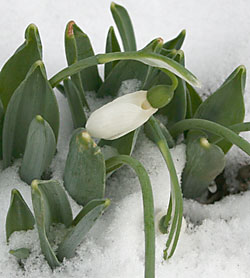 We’re back to ‘normal’ winter temperatures here — teens during the day and -20 F windchills at night. But it was only a few weeks ago that I was writing an article at work about how the warm winter might affect our gardens and crops. (Come spring, expect fewer blooms, due to mild early winter, say Cornell horticulturists.)
We’re back to ‘normal’ winter temperatures here — teens during the day and -20 F windchills at night. But it was only a few weeks ago that I was writing an article at work about how the warm winter might affect our gardens and crops. (Come spring, expect fewer blooms, due to mild early winter, say Cornell horticulturists.)
There was tremendous interest in this topic at the time. Many folks who usually cuss at cold weather had this strange feeling in the pit of their stomachs that something was very wrong with the weather. While one warm winter does not a global climate catastrophe make, I’m hoping that it was a teachable moment about what we’re up against for the foreseable future.
Unfortunately, the big-picture changes aren’t as obvious as the cherry tree downtown in full bloom in early January. That tree will likely recover and –while it may not bloom again in spring — it will likely not suffer any long-term damage.
What we will face — more variability, ecosystem creep, an influx of weeds and pests — will likely fly beneath the radar. It will be tough to put a monetary value on the cost. But it’s going to be expensive.
Here are some more details from the section of that article on the effects of global warming on the Northeast:
The long haul
In the future, chances are good we will see more warm winters like this one, says David Wolfe, a Department of Horticulture scientist who is studying how climate change, caused in part by increasing carbon dioxide levels in the atmosphere, is affecting agriculture in the Northeast.
“We may still have some very cold winters,” says Wolfe. “But all the climate models point to a warming trend, and nature is already responding to the warmer conditions.”
In the Northeast, lilacs are blooming four days earlier on average than they did in the 1960s, Wolfe points out. Warmer temperatures are also affecting cultivated crops like grapes (blooming six days earlier) and apples (blooming eight days earlier). These examples are just the tip of the iceberg in the mounting evidence that the climate is warming.
Studying long-term climate trends can’t pinpoint what the weather will be like next week or next winter. But Wolfe details what gardeners and growers can expect as the Northeast climate warms over the long haul:
- Warmer winters may allow gardeners to grow some plants that before could only grow in milder climes. The wine grape industry, which relies on varieties that are only marginally cold-hardy in upstate New York, may benefit from warmer winters.
- On the other hand, aggressive weeds and invasive plants will also move north. Studies show those species are better equipped than crops to take advantage of the increasing carbon dioxide levels in the atmosphere that are driving warming, notes Wolfe.
- Pests and diseases that were held in check by the cold may become more of a problem. Lifecycles of beneficial insects may get out of synch with the pests they help control.
- Natural ecosystems will shift north, with oak-pine forests replacing maple-beech-birch forests in some places, for example.
- Less reliable winter snow cover may hurt over-wintering of some perennial crops and flowers.
- Hotter summers may cause heat stress even in warm-season crops such as tomatoes.
It’s uncertain if weather variability will increase along with temperatures. But most models predict fewer but more concentrated precipitation events, causing more flooding and drought.
For gardeners, adapting to a changing climate may be as simple finding better-adapted tomato varieties or other plants to grow. But for commercial growers, changes are likely to be more involved. “Everyone is going to have to invest some to respond to climate changes,” says Wolfe.
For more information, visit: www.climateandfarming.org.
Dave’s a pretty cautious scientist, and not prone to hyperbole. He’s also the author of a great book, Tales from the Underground: A Natural History of Subterranean Life.


For an involved discussion of global warming, we this thread on Garden Rant: http://www.gardenrant.com/my_weblog/2007/03/bring_on_the_ap.html
I’ve also got another posting about global warming in Sports Illustrated here: http://www.remarc.com/craig/?p=68
Hi,
Thanks for the additional resources you contributed in your comment to my above blog post. This is a really fascinating–and foreboding–topic.
Best,
Sarah